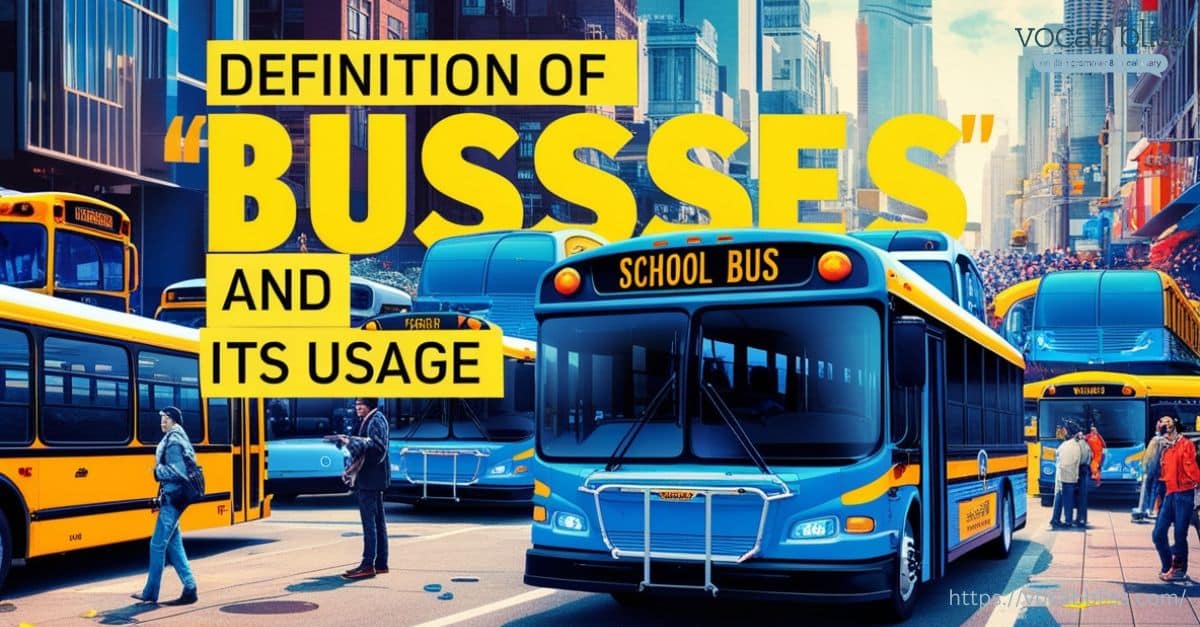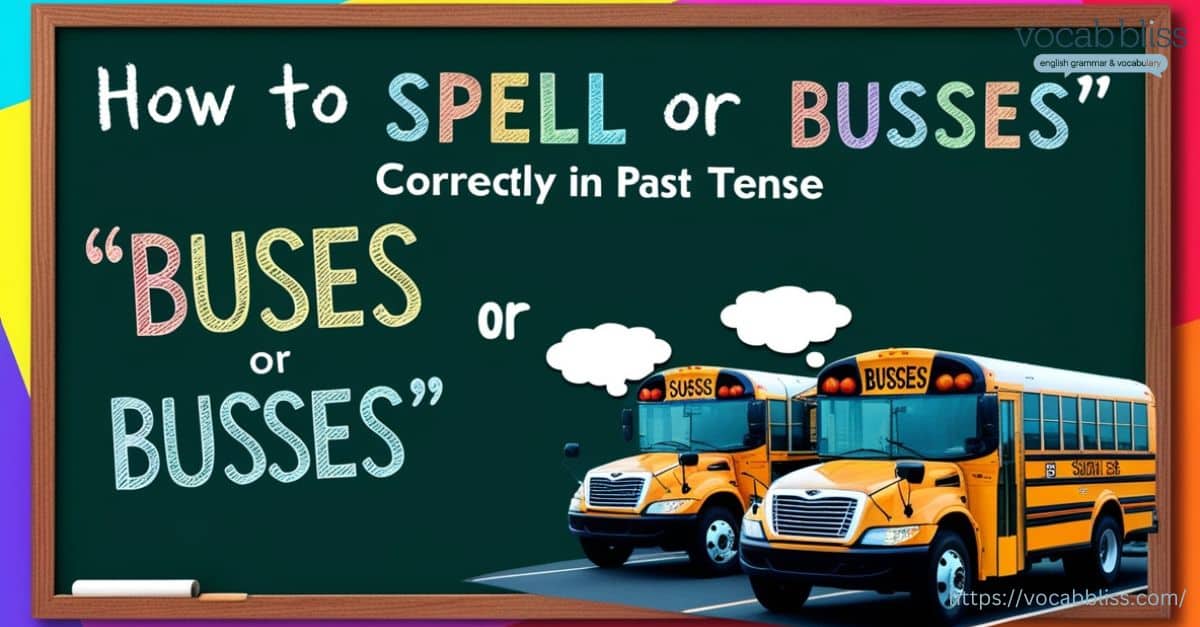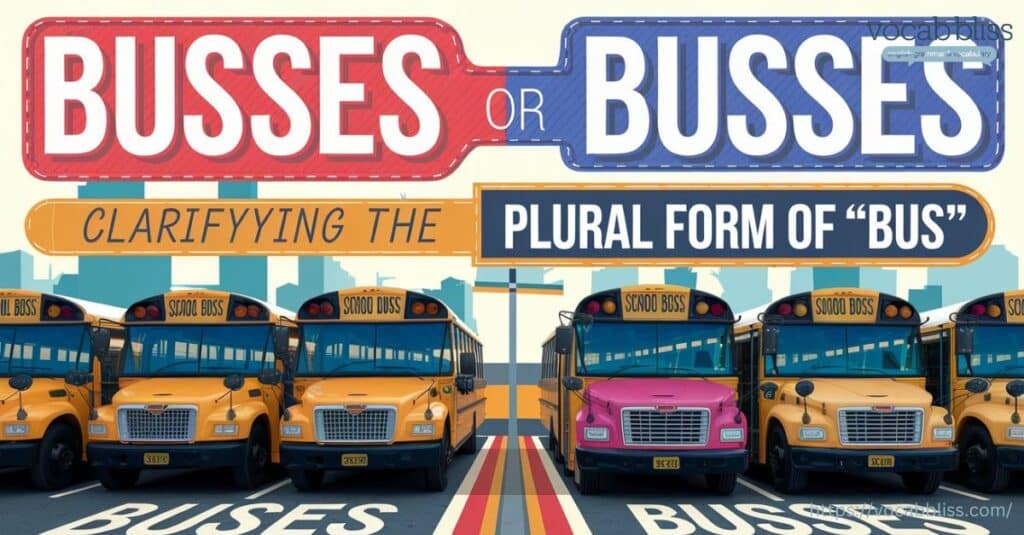When writing in English, even seemingly simple words like “bus” can cause confusion, especially when forming their plural. Is it Busses or Buses? This article dives deep into the rules, nuances, and practical usage of these terms, equipping you with the knowledge to use them confidently.
⚡Quick Summary
In the debate of “busses or buses,” the answer is simple: “buses” is the correct plural form of “bus.” While “busses” may appear in contexts like kissing or informal language, it’s crucial to understand the distinctions to avoid confusion in your writing. Whether you’re writing a blog post, content for marketing, or educational material, getting it right not only boosts your credibility but also improves your SEO ranking and reader engagement. So next time you’re unsure, remember—buses are the way to go for transportation, while busses might just mean a kiss!
Discover more: Onsite or On-Site: Examining Fundamental Variations
Understanding “Busses or Buses”
Definition of “Busses” and Its Usage

The term “busses” is a valid word in English, but its meaning depends heavily on context. Historically, people occasionally used “busses” as the plural form of “bus.” However, this usage has become outdated and is rarely seen in modern writing.
In today’s English, people more commonly associate “busses” with the verb “buss,” meaning “to kiss.” For example:
- “The couple exchanged busses under the mistletoe.”
Here, “busses” refers to multiple kisses, emphasizing affection rather than transportation.
Contexts Where “Busses” Might Appear:
- Romantic Literature: “He left with a few quick busses on her hand.”
- Poetic Expressions: “The busses of the past lingered in her memory.”
It’s important to note that using “busses” to mean vehicles can cause confusion since it’s not the standard plural form in modern usage.
Definition of “Buses” and Its Usage
The word “buses” serves as the standard and widely accepted plural of “bus.” Specifically, people use it in transportation contexts to refer to multiple motorized vehicles designed to carry passengers. In addition, it is the correct form to use when discussing public transport or any situation involving more than one bus.
For example:
- “The school district purchased new buses for student transportation.”
- “We waited at the terminal, watching several buses arrive and depart.”
Proper Usage in Transportation Contexts:
- Public Transit: “The city deployed electric buses to reduce emissions.”
- School Systems: “Yellow buses lined up in front of the school.”
- Tourism: “Tour buses crowded the parking lot at the Grand Canyon.”
By using “buses” when referring to vehicles, you ensure clarity and adhere to modern English conventions.
Side-by-Side Comparison
When it comes to “busses or buses,” the differences lie in their spelling, meaning, and usage. Understanding these distinctions will help you use them correctly in your writing. To clarify, here’s a quick comparison:
| Aspect | Busses | Buses |
|---|---|---|
| Spelling | Ends with “-ss” | Ends with “-s” |
| Meaning | Primarily refers to kisses or to convey someone (e.g., bus passengers) | Refers to the plural form of a bus, the vehicle |
| Usage | Rarely used in the plural form for vehicles; mostly used for kisses or to bus someone | Standard plural for multiple buses (vehicles) |
| Pronunciation | /ˈbʌsɪz/ | /ˈbʌsɪz/ |
| Examples | “She busses him goodbye.” | “The buses arrived on time.” |
| Context | Often informal, related to affection or transportation action | Formal and commonly used in public transport contexts |
This chart highlights the key differences. While both terms may sound similar, “buses” is the correct plural form when referring to vehicles. “Busses,” on the other hand, has a more limited usage, generally referring to actions like giving someone a kiss or transporting them in a bus.
Everyday Usage Examples

Although the use of “busses” is less common today, it still has specific applications. Below are examples that showcase its correct usage:
- Romantic Context:
- “The lovers shared quick busses before parting ways.”
- “Their reunion was marked by heartfelt busses on each cheek.”
- Poetic or Artistic Expressions:
- “Soft busses were exchanged beneath the twilight sky.”
- “The child’s busses on her mother’s forehead were full of innocence.”
- Historical or Rare Usage for Vehicles (archaic):
- “In the early 20th century, the word ‘busses’ occasionally referred to public vehicles.”
It’s important to avoid using “busses” for vehicles in modern writing to prevent misunderstandings.
Examples of Sentences Using “Buses”
In contrast, people widely recognize “buses” as the standard plural form for vehicles in everyday language.Below are examples illustrating its usage:
- Public Transportation:
- “The city introduced hybrid buses to reduce pollution.”
- “Several buses arrived at the station at once, causing a brief commotion.”
- School Settings:
- “The buses lined up outside the school, waiting for the students to board.”
- “Parents appreciate the safety measures on the new school buses.”
- Travel and Tourism:
- “Tour buses carried visitors around the historical landmarks.”
- “Bus companies in Europe often equip their buses with Wi-Fi and charging ports.”
By consistently using “buses” for vehicles, your writing aligns with modern English norms and avoids confusion.
Busses or Buses: Which One Is Correct?
In modern English, “buses” serves as the correct plural form of “bus.” Both British and American English universally accept this spelling, and people use it in all transportation contexts.
For example:
- “The buses in the city operate 24/7 to meet passenger demand.”
People consider the use of “busses” as a plural form of “bus” outdated and incorrect in contemporary writing. Instead, “busses” refers to the plural of the verb “buss” (to kiss).
Exceptions or Rare Contexts for “Busses”
- Historical or archaic texts may use “busses” to mean vehicles, though this usage is no longer standard.
- Creative or poetic writing might use “busses” metaphorically or to mean “kisses.”
Remember, choosing “buses” in transportation-related writing avoids confusion and aligns with modern grammar rules.
How to Pronounce “Busses”?
The word “busses” is pronounced as:
- /ˈbʌsɪz/
Pronunciation Tips:
- Emphasize the first syllable: “BUS.”
- The ending sounds like “iz.”
The pronunciation remains consistent whether people use “busses” to refer to kisses or in older contexts referring to vehicles.
What Are the Correct Examples of “Busses” in Sentences?
Below are examples that highlight correct and incorrect uses of “busses”:
Correct Uses of “Busses”
- Referring to Kisses:
- “She gave her child two warm busses on the forehead.”
- “The romantic poem was filled with mentions of sweet busses.”
- Historical Context for Vehicles:
- “People knew the busses from the old depot for their reliability.”
Incorrect Uses of “Busses”
- Modern Plural of “Bus” (Incorrect):
- “The school purchased ten new busses.”
- “City busses are running late due to traffic.”
- Instead: Use “buses.”
Understanding these nuances ensures your writing is both accurate and professional.
How to Spell “Buses or Busses” Correctly in Past Tense

Spelling the past tense of “buses or busses” depends on their meaning and usage. Here’s how to do it correctly:
- For the verb “buss” (to kiss), the past tense is spelled “bussed.”
Example: “They bussed each other on the cheek as a friendly gesture.” - For the noun “bus” (a vehicle), the word does not change in past tense because it’s not a verb. Instead, verbs like “boarded,” “drove,” or “rode” are used to describe past actions involving buses.
Example: “We boarded the buses early in the morning.”
It’s essential to differentiate between the noun and verb forms to spell their past tense forms correctly.
How to Pronounce “Busses”?
The word “busses” (plural of “buss”) is pronounced as:
- /ˈbʌsɪz/
Breakdown of Pronunciation:
- “Buss”: Pronounced as /bʌs/ (rhymes with “us”).
- “-es”: Adds an /ɪz/ sound, similar to the ending of “kisses.”
So, “busses” sounds like “BUS-iz.”
How to Pronounce “Buses”?
The word “buses” (plural of “bus”) is pronounced as:
- /ˈbʌsɪz/
Breakdown of Pronunciation:
- “Bus”: Pronounced as /bʌs/ (rhymes with “plus”).
- “-es”: Adds an /ɪz/ sound.
Interestingly, “busses or buses” share the same pronunciation despite their different meanings and spellings. This homophonic similarity can be confusing, but context usually clarifies the intended meaning.
What Is the Meaning of Busses?
The term “busses” primarily serves as the plural form of “buss,” which means a kiss. However, this usage is more poetic or old-fashioned, and consequently, it is rarely encountered in everyday conversations.
For example:
- “She gave him quick busses on both cheeks before saying goodbye.”
In rare, archaic contexts, people used “busses” as the plural of “bus,” but now “buses” replaces this obsolete usage.
Distinguishing the Two Meanings
- “Busses” (as kisses): Used in literary or emotional contexts.
- “Busses” (archaic vehicles): Historical usage, now replaced by “buses.”
What Is the Etymology of Buses?
The word “bus” is derived from the Latin word “omnibus,” meaning “for all.” Initially, it referred to public transport vehicles designed to carry many passengers. Over time, “omnibus” was shortened to “bus” for convenience.
Evolution of Plural Forms:
- 19th Century: The word “busses” was occasionally used as the plural of “bus.”
- Modern English: By the early 20th century, “buses” became the standard plural form, aligning with simplified spelling conventions.
This evolution reflects the natural tendency of language to adapt for ease of use and clarity.
How to Use “Busses” in a Sentence?
The correct usage of “busses” depends on its meaning as the plural of “buss” (a kiss). Here are some examples:
- Romantic Context:
- “Their goodbye was marked by sweet busses under the moonlight.”
- “In the painting, the couple exchanged gentle busses.”
- Metaphorical or Literary Use:
- “The poet described the wind’s busses as soft and fleeting.”
- “She received warm busses on her cheeks from her family.”
Incorrect Usage:
- Avoid using “busses” when referring to vehicles.
- ❌ “The city busses are overcrowded during rush hour.”
- ✅ Instead: Use “buses” for transportation.
What Are the Synonyms of “Busses”?
For “busses” (kisses), the following synonyms can be used based on the context:
| Synonym | Context |
|---|---|
| Kisses | General synonym, most common equivalent. |
| Pecks | Light or quick kisses, often informal. |
| Smooches | Casual or playful synonym for kisses. |
| Osculations | Scientific or poetic term for kisses. |
| Embraces | Broader term including hugs and kisses. |
These synonyms can add variety and nuance to your writing, particularly in creative or emotional contexts.
By understanding the subtle differences between “busses” and its synonyms, writers can craft more precise and engaging sentences.
What to Know for Using “Busses vs Buses” in Content Writing
When crafting content, especially for professional or academic audiences, understanding the correct usage of “buses vs busses” is critical.Misusing these terms can confuse readers, harm your credibility, and negatively affect search engine optimization (SEO).
As a result, this can lead to reduced trust from your audience and lower rankings in search results. Therefore, it’s crucial to use the correct terms consistently to maintain clarity and improve your online presence. Therefore, it’s essential to use them correctly. Let’s now explore how to ensure proper usage and avoid common pitfalls.
How to Fix Incorrect Uses of “Busses” in Content Writing and Marketing?
Misusing “busses” instead of “buses” is a common error, often stemming from a misunderstanding of their distinct meanings. Follow these steps to identify and correct such mistakes:
Identify the Intended Meaning
- Transportation Context: If discussing vehicles, use “buses.”
Example:- Correct: “The school buses are parked near the playground.”
- Incorrect: “The school busses are parked near the playground.”
- Kissing Context: If referring to kisses, use “busses.”
Example:- Correct: “They exchanged quick busses before parting ways.”
Use Grammar Tools
Leverage spelling and grammar checkers like Grammarly or Hemingway to spot errors. Many tools will flag “busses” as incorrect if used inappropriately.
Cross-Check Definitions
When in doubt, consult a reliable dictionary or thesaurus to verify the meaning and proper context for each term.
Train Your Team
For content marketers, it is essential to ensure your team is aware of these distinctions. Additionally, a style guide can help reinforce proper usage across all written materials, ensuring consistency and accuracy in every piece of content.
By systematically addressing misuse, you can maintain professionalism and clarity in your writing.
What Are the Other Misspelled Examples Similar to “Busses and Buses”?
Here are some frequently misspelled or confused examples similar to “buses and busses”:
| Incorrect Spelling | Correct Spelling | Explanation |
|---|---|---|
| Bus’s | Bus’s (correct but context-dependent) | Singular possessive, as in “the bus’s tire.” |
| Buss | Bus | “Buss” means a kiss, not a vehicle. |
| Busss | Buses | Typographical error; “busss” is invalid. |
| Buzes | Buses | Phonetic spelling error. |
How to Avoid These Errors:
- Proofread Thoroughly: Check for contextual errors that automated tools may overlook.
- Learn Common Homophones: Understand similar-sounding words like “bus” and “buss” to avoid confusion.
- Practice Contextual Awareness: Always consider the context in which the word is used.
How Does Writing “Busses” Wrong Affect SEO and Content Marketing?

Errors in spelling, especially between “busses or buses,” can impact content performance in several ways:
Decreased Readability
- Misspellings make content harder to read and reduce audience engagement. Readers may question the credibility of the writer or brand.
SEO Ranking Impacts
- Search Engines Penalize Errors: Google and other search engines prioritize clear, authoritative content. Frequent spelling mistakes can lower your ranking.
- Keyword Confusion: Using the wrong term (e.g., “busses” for vehicles) may weaken your keyword relevance. For instance, someone searching for “school buses” may not find your article due to incorrect spelling.
Reduced Audience Trust
- Professionalism is critical in content marketing. Consistent errors in spelling or grammar suggest a lack of attention to detail, which can erode trust.
Example of SEO-Friendly Writing:
- Correct: “The city buses provide an efficient means of transportation.”
- Incorrect: “The city busses provide an efficient means of transportation.”
Impact on Click-Through Rates (CTR)
Users are less likely to click on articles with visible errors in their titles or descriptions. For example:
- Error: “Tips for Choosing the Right School Busses”
- Correct: “Tips for Choosing the Right School Buses”
By focusing on accurate spelling and context, you can enhance your content’s readability, improve SEO performance, and establish authority in your niche.
Conclusion
In summary, the correct plural form of “bus” is “buses.” While “busses” exists, its primary use relates to kisses and is rare in everyday contexts. For accurate communication, especially in writing, “buses” should always be your choice for vehicles. Understanding these distinctions ensures clarity and professionalism in your writing.
Expand Your Knowledge:
- Axle or Axel: What’s the Difference?
- in route or en route: Which choice is correct?
- Sueing or Suing? Choose the Right Term
- Appendices or Appendixes? Clarifying Usage

Jorge Phillips is an experienced blogger who writes for Vocab Bliss, sharing his passion for the English language. With a knack for simplifying complex grammar rules and a focus on commonly confused words, Jorge helps readers navigate the nuances of English with ease. His insights aim to make learning engaging and practical.







